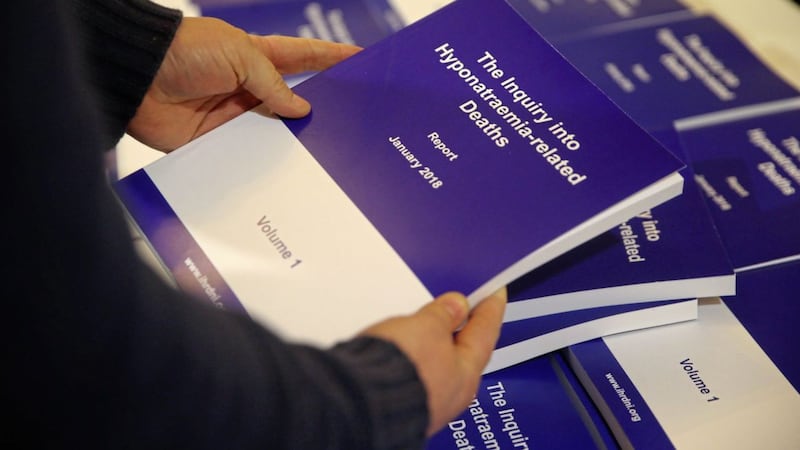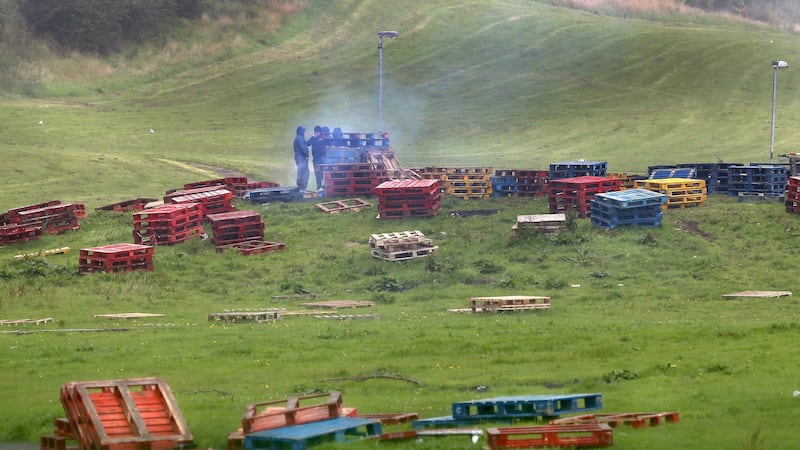A SCATHING report into the deaths of five children in Northern Ireland hospitals has delivered a devastating assessment of senior doctors and managers who "covered up" failings into "avoidable" deaths.
Fourteen years after a public inquiry was first ordered into the hyponatraemia-related fatalities, families wept yesterday as Sir John O'Hara QC described an "indefensible" culture in which parents were "deliberately misled" by consultants and officials intent on "avoiding scrutiny".
And he hit out at some senior health service witnesses who had to have the "truth dragged out of them" when giving evidence during 148 days of hearings.
"The cases brought against the trusts were open and shut... but trusts aggravated parents' grief by denials of liability and imposed confidentiality clauses. This was unwarranted," he said.
The inquiry chairman added that scrutiny came about "in spite of doctors" and went further by saying some medics had behaved "inadequately, dishonestly and ineptly".
Mr Justice O'Hara also slated the north's most senior doctor at the time, the Chief Medical Officer Dr Henrietta Campbell, for her handling of the deaths, describing her responses to journalists as "inaccurate, defensive, evasive and complacent".
The 684-page report focuses on the deaths of Adam Strain (4), Claire Roberts (9), Raychel Ferguson (9), 18-month-old Lucy Crawford and Conor Mitchell, who was 15.
Their deaths took place between 1995 and 2003 at the Royal Belfast Hospital for Sick Children in Belfast.
Hyponatraemia occurs when there is a shortage of sodium in the bloodstream.The investigation examined whether fatal errors were made in the administration of intravenous fluids.
Acknowledging that the findings would be "difficult and emotional reading" for the families, the inquiry chairman said four of the five deaths could have been avoided and that the medical care provided "fell far below acceptable standards".
Mr Justice O'Hara repeatedly pointed to a failure by medics and their health trust managers to inform both families and the coroner about major shortcomings in their loved ones' care.
Referring to the treatment of Adam Strain, a "happy little boy" from Holywood who died in November 1995 after renal transplant surgery, he said his death had resulted from "negligent care".
His "devoted" mother, Debra Slavin, was not told about the failings and the case was never referred to the coroner.
Mr Justice O'Hara was particularly critical of an anaesthetist involved in Adam's care, who made mistakes which were "so obvious".
"I do not know the full story of what went on in that operating theatre... but it was truly shocking," he said.
He added: "Lessons that could have been learned from his death were not shared."
The case of Claire Roberts, who passed away in October 1996 in the Royal within two days of being admitted with vomiting, also involved information being "withheld" from families and the coroner.
The youngest child of Alan and Jennifer Roberts, they had been "deliberately misled" by medics and were told she received "good care".
Mr Justice O'Hara said the reason for not informing the coroner was to "avoid scrutiny" and described it as a "cover up by consultants".
He referred to correspondence sent by the health trust to the Roberts family in 2005 - a year after the inquiry was ordered - describing it as "inaccurate, evasive and unreliable".
"Efforts to protect the trust's reputation was apparent again even after the inquiry was established," he added.
The parents of Lucy Crawford, who withdrew from the inquiry in 2008, also failed to learn the truth about their daughter's death in April 2000 at the Royal - a development Mr Justice O'Hara said had become "depressingly familiar".
The death of Raychel Ferguson in 2001 following initial treatment at Altnagelvin Hospital was "different" in that failings were identified and the case was referred to the coroner - but none of the information was shared with her family.
"There was no possible reason not to tell the Fergusons about failings," said the inquiry chairman.
"Accordingly there were efforts to mislead the coroner at Raychel's inquest."
In relation to Conor Mitchell, a teenager with cerebral palsy who died at the Royal in May 2003, the Southern Trust - which had been involved in his care following his treatment at Craigavon Area Hospital - admitted that "guidance hadn't been followed".
A total of 96 recommendations are made in the extensive report, including the introduction of a "duty of candour" for health professionals "to tell patients and their families about major failings in their care".
"Doctors and managers can't be relied on to do the right thing at the right time," Mr Justice O'Hara said.
The three hospital trusts criticised in the report made an unreserved apology yesterday.
Speaking on behalf of the Belfast, Western and Southern Health and Social Care Trusts, Dr Cathy Jack acknowledged there had been "many failings".
In a statement, the medical director with the Belfast Trust said: "We welcome today's publication of the report and will urgently review the recommendations to ensure that all possible steps have been taken to prevent this from ever happening again.
"We made mistakes. We were not as open and transparent as we could and should have been and opportunities to learn from each other and to make our care safer were missed.
"For this we are truly sorry.
"Surely there can be no greater pain for a parent than to lose their child and then to learn that errors occurred which were avoidable."
Dr Jack said more must be done to promote openness and transparency.
"Anyone that reads this report will be deeply saddened at the events of 15 or 20 years ago and how it took an independent inquiry into the deaths of these five children to get the answers we have today.
"You could not be affected and moved by what we heard.
"There were elements and statements in that report that made me feel ashamed on a personal level.
"But, I have to recognise that for every item and every doctor or nurse criticised there is another 10 or 100 who actually need to be recognised for their hard work and commitment."








